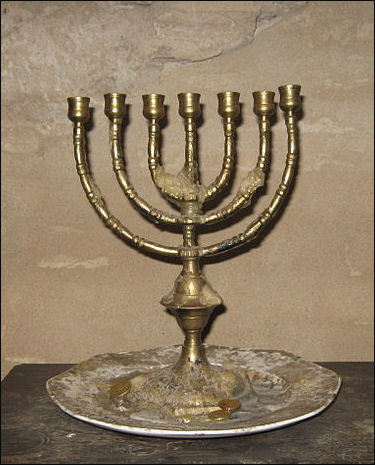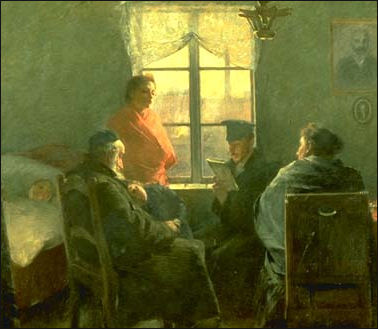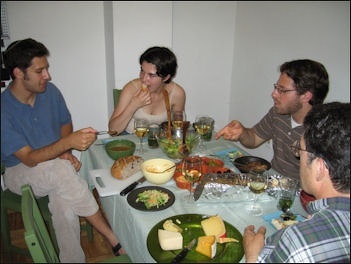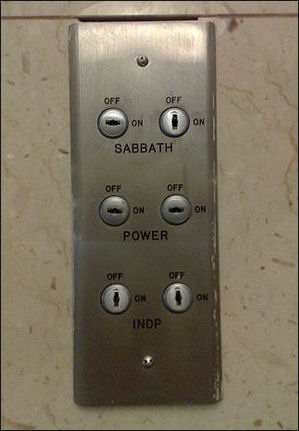Home | Category: Jewish Holidays / Jewish Holidays
JEWISH SABBATH

Menora from Cordoba Spain The Jewish Sabbath is mostly on Saturday. It marks the day of rest taken by God after he created the earth. For Jews the first six days of the week correspond to the first days of creation, and the seventh is the day of divine rest, or the Sabbath. Since the week begins with Sunday the Jewish Sabbath falls on Saturday.
The Sabbath lasts from sunset on Friday to sunset on Saturday. Jews call it “Shabbat” (Hebrew) or Shabbos (Yiddish). Some say the Shabbat is about stepping aside from our professional lives and can include secular rituals like bringing flowers home on Friday. The Talmud calls Shabbat “The Gift of Rest”. It is not supposed to be a duty but rather something embraced with enthusiasm and joy. Joe Lieberman (See Below) said that when he was young there was a “sense of expectation, the magic of lighting the candles, first by my mother and then by my wife”, adding his oldest son, wanted to receive the traditional blessing of the child that parents perform when he was now in his 40s. [Source: Jennifer Rubin, Washington Post, September 25, 2011]
According to the Worldmark Encyclopedia of Religious Practices: The Sabbath is the paradigm for all holidays in Judaism. Associated with God's creation of the world and with the enduring source of life's ultimate meaning, the Sabbath is marked by a cessation of work and mundane activity and by dedication to worship, thanksgiving, study of the Torah, and reaffirmation of Israel's covenant with God. With important modifications, this pattern applies to all major Jewish festivals. [Source: Paul Mendes-Flohr Worldmark Encyclopedia of Religious Practices, 2000s, Encyclopedia.com]
Websites and Resources: Virtual Jewish Library jewishvirtuallibrary.org/index ; Judaism101 jewfaq.org ; torah.org torah.org ; Chabad,org chabad.org/library/bible ; BBC - Religion: Judaism bbc.co.uk/religion/religions/judaism ; Encyclopædia Britannica, britannica.com/topic/Judaism; Yivo Institute of Jewish Research yivoinstitute.org ; Internet Jewish History Sourcebook sourcebooks.fordham.edu ; Aish.com aish.com ; Jewish Museum London jewishmuseum.org.uk
RECOMMENDED BOOKS:
“The Gift of Rest: Rediscovering the Beauty of the Sabbath”
by Joseph I. Lieberman and David Klinghoffer Amazon.com ;
“The Sabbath” by Abraham Joshua Heschel , Ilya Schor, et al. (FSG Classics) Amazon.com ;
“Your Guide to the Jewish Holidays: From Shofar to Seder” by Cantor Matt Axelrod Amazon.com ;
“The Jewish Way: Living the Holidays” by Irving Greenberg Amazon.com ;
“The Jewish Holiday Table: A World of Recipes, Traditions & Stories to Celebrate All Year Long” by Naama Shefi. Devra Ferst Amazon.com ;
“Living a Jewish Life: Jewish Traditions, Customs, and Values for Today's Families” by Anita Diamant, Howard Cooper, et al. Amazon.com ;
“To Be a Jew Today: A New Guide to God, Israel, and the Jewish People”
by Noah Feldman Amazon.com ;
“Essential Judaism: Updated Edition: A Complete Guide to Beliefs, Customs & Rituals”
by George Robinson Amazon.com ;
“Guide for the Perplexed” by Moses Maimonides, Andrea Giordani, et al. Amazon.com ;
“Living Judaism: The Complete Guide to Jewish Belief, Tradition, and Practice”
by Wayne D. Dosick Amazon.com ;
Beliefs About the Jewish Sabbath
Jews believe that if God took a day of rest on the Sabbath, then they should too. The Sabbath is regarded as a symbol of the covenant between God and the Jews. In Exodus 31:12-17: "The Lord spoke unto Moses, saying...Verily my Sabbaths ye shall keep; for it is a sign between men and you throughout your generations; that ye shall know that I am the Lord that doth sanctify you...Ye shall keep the Sabbath therefore...It is a sign between me and the children of Israel for ever."
According to the BBC: “The Sabbath is part of the deal between God and the Jewish People, so celebrating it is a reminder of the Covenant and an occasion to rejoice in God's kept promises. Most Jewish people look forward to Shabbat all week. They see it as God's gift to his chosen people of a day when they take time out from everyday things to feel special. Shabbat is a time with no television, no rushing to the demands of the telephone or a busy work schedule. People don't think about work or other stressful things. It's an oasis of calm, a time of stillness in life.” |::|
The Sabbath is regarded as the most important holiday or religious day because it is the only one mentioned as an actual commandment. Jews have traditionally lit candles — lit at sundown on Friday — and said special prayers over wine and bread during the main Saturday meal. Parents traditionally bless their children and the faithful are supposed to study the Torah. The Sabbath ends when the candles are doused with wine and sweet spices are smelled.
Jewish Sabbath Practices

The Sabbath Rest
by Sanuel Hirszenberg In Israel, from sundown on Friday to nightfall on Saturday. many places, including restaurants, food stores and buses, are closed or not operating although in many places shops, theaters and shopping malls remain open. There is often a shopping rush before and after the Sabbath.
Mitzvot (Jewish Laws) Related to Sabbath
P 41 — The Shabbos Additional Offering
P154 — Resting on Shabbos
P155 — Proclaiming the sanctity of Shabbos
N320 — Not to work on Shabbos
N321 — Not to go beyond city limits on Shabbos
N322 — Not to punish on Shabbos
According to the BBC: “The Sabbath is commanded by God. Every week religious Jews observe the Sabbath, the Jewish holy day, and keep its laws and customs. God commanded the Jewish People to observe the Sabbath and keep it holy as the fourth of the Ten Commandments. Shabbat is very much a time when families come together in the presence of God in their own home. Singles, or others with no family around may form a group to celebrate Shabbat together. [Source: BBC |::|] “In practical terms the Sabbath starts a few minutes before sunset on Friday and runs until an hour after sunset on Saturday, so it lasts about 25 hours. Jews often call the day Shabbat, which is Hebrew for Sabbath, and which comes from the Hebrew word for rest. The traditional Sabbath greetings are Shabbat Shalom (Hebrew), or Gut Shabbos (Yiddish). |::|
In ancient times, enemies often attacked Jews on the Sabbath because many of them refused to take up arms and defend themselves and were thus easily massacred. Most Jews began their "day" at sunset through the nineteenth century. Orthodox Muslims, who follow the Holy Script, continue to begin their day at sunset — and still set their clocks at twelve when the sun goes down.
Work and the Jewish Sabbath
Orthodox Jews are not allowed to do anything on the Sabbath that can be construed as work. Jewish law, or Halakha, outlines 30 categories of work that can not be performed on the Holy Day, including driving a car, using a telephone, listening to radio, watching television, lighting fires, turning on lights,, writing, operating machinery. To satisfy fundamentalists Israel's national airline El Al does not fly on the Sabbath.*
Figuring out what is acceptable on the Sabbath and what isn’t has been described “one of the greatest complexities of Judaism. Even pushing the button of an elevator can be construed as work. Hotels in Israel have special elevators for the Sabbath which stop at every floor so no one does any work by pushing a button. The Institute of Science and Halacha has extended great effort into making even submarines Sabbath-compliant.
Completing an electrical circuit is considered work and ultra-Orthodox engineers have gone through great lengths to devise milking machines, metal detectors, motorized wheelchairs, medical machines, computers and alarms that work using circuits that remained closed all the time and thus can be used on the Sabbath. To get around the restriction on writing it engineers have developed pens whose ink disappears after a few days (writing is defined as leaving a permanent mark).
There are laws on the books in Israel that prohibit teenagers from working on the Sabbath. Ultra-Orthodox Jews want to see similar rules that prevent people from going to beach, visiting shopping malls and talking on their cell phones on the Sabbath. One ultra-Orthodox rabbis went as far as saying that Sabbath violators “will be killed.”
Sabbath Customs

Sabbath meal
According to the BBC: “In order to avoid work and to ensure that the Sabbath is special, all chores like shopping, cleaning, and cooking for the Sabbath must be finished before sunset on Friday. People dress up for Shabbat and go to considerable trouble to ensure that everything is organised to obey the commandment to make the Sabbath a delight. [Source: BBC |::|]
“Sabbath candles are lit at sunset on a Friday. The woman of the house usually performs this ritual. It is an integral part of Jewish custom and ceremony. The candles are placed in candlesticks. They mark the beginning of each Sabbath and represent the two commandments Zachor (to remember the Sabbath) and Shamor (to observe the Sabbath). After the candles are lit, Jewish families will drink wine. Sabbath wine is sweet and is usually drunk from a special goblet known as the Kiddush Cup. The drinking of wine on the Sabbath symbolises joy and celebration. |::|
“It is also traditional to eat challah, a soft rich eggy bread in the shape of a braid. Challah is a eaten on the Sabbath and Jewish holidays except for the Passover when leavened bread is not permitted. Under Jewish law, every Jew must eat three meals on the Sabbath. One of the meals must include bread. Observant Jews will usually eat challah at the beginning of a Sabbath meal. Before the challah is eaten, the following prayer is recited: “Baruch atah Adonai, Eloheinu Melech ha'olam, hamotzi lechem min ha'aretz”, meaning “Blessed are you, Lord our God, King of the universe, who brings forth bread from the earth. Other blessings, prayers, songs and readings may also be used.” |::|
“It is traditional, too, for parents to bless their children on Shabbat. The blessing for daughters asks that they become like the four matriarchs, Sarah, Rebecca, Rachel and Leah, while sons are blessed to grow up like Ephraim and Menasheh, two brothers who lived in harmony. Some of the family will have been to synagogue before the Sabbath meal, and it is likely that the whole family will go on Saturday.” |::|
Sabbath — a Time for Romance and Sex?
Joe Lieberman was U.S. senator from Connecticut and the Vice President candidate in 2000 U.S. presidential election with the Democrat presidential candidate Al Gore. He is Jewish and wrote a book about the importance of the sabbath called “The Gift of Rest, Rediscovering the Beauty of the Sabbath”. Jennifer Rubin wrote in the Washington Post that the book “ is a guide to the sabbath,. As an Orthodox Jew, he has in a very public way had to navigate through a career that operates on a non-Jewish schedule and often features Friday night or Saturday events. While he considered arranging the material thematically, he eventually decided on a chronological order, beginning with Friday afternoon preparations and ending with Havdalah, the ceremony that marks the separation between Shabbat and the rest of the week. [Source: Jennifer Rubin, Washington Post, September 25, 2011]

Adam and Eve
In the book Lieberman writes: “For me, Sabbath observance is a gift because it is one of the deepest, purest pleasures in my life. It is a day of peace, rest and sensual pleasure...It engages the senses — sight, sound, taste, smell and touch — with beautiful setting, soaring melodies, wonderful food and wine and lots of love.” He said that his colleagues “know what I don’t do — work — but they don’t know what I do” on Shabbat. He wants to dispel the notion that Shabbat is “a day of denial or seclusion. It does of course have serious moments.” But, he says with a grin, “By and by we have a great time.”
His book conveys that far from a passive exercise, Shabbat, and the preparations before it, are jammed with activity — special meals, synagogue services, time with friends, reading for pleasure, walks and time with family. He also raised some eyebrows in discussing that “one religious ‘responsibility’ given to every married Jew is to make love with their spouse on the Sabbath because this is meant to be a day on which we experience the fullness of life.” The book, stops at the “bedroom door,” but he does tell the reader, “Much of the staging of Friday night is conducive to romance: the passionate ‘Song of Songs’ is read, the wine, the candles, the set table, everyone dressed up and looking their best yet relaxed and unhurried. It’s a brilliantly conceived recipe for reunion.”
Eruvs
An eruv is an area within which observant Jews can carry or push objects on the Sabbath without violating a Jewish law that prohibits carrying anything except within the home. There are over 200 eruvs (or eruvim) in the world. According to the BBC: An eruv must be 'completely enclosed'. The area is not enclosed by building a special wall round it — most of it is enclosed by existing natural boundaries like railway lines or walls. What matters is that the area is completely enclosed by boundaries that conform to Jewish law and has to recognised as valid by an Orthodox Jewish religious court. [Source: BBC |::|]
An eruv is created using physical features, like walls and hedges, railway lines and roads, to completely enclose an area of land. The open spaces between the existing features are filled in by erecting poles with nylon fishing line (or wire) strung in between. The poles and lines are regarded as forming doorways in the boundary — the poles are the sides of the door and the lines are the lintel across the top. The flimsier parts of the boundary are inspected every week to check that the boundary is intact and that none of the fishing line or poles has fallen down.
In ancient times the rabbis decided that if several houses were built round a closed courtyard, then they could be considered a single giant house, and so things could be carried between them. The continuous boundary of an eruv effectively turns a large area into a sort of imaginary courtyard within which anyone is allowed to carry objects or push prams or wheelchairs; activities which would otherwise be forbidden on the Sabbath. So an eruv converts an area in which there were once many individual Jewish homes into one big home, shared by one big Jewish family.
There is nothing to stop non-Jews entering the eruv area either on the Sabbath or during other times. But there are certain things that may invalidate an eruv: 1) It isn't valid if it encloses 600,000 or more people (Jewish or non-Jewish). 2) The poles must be reasonably vertical, the lines tight. 3) Some say the lines must go across the top of the poles (as the lintel of a door goes over the top of the side pieces).
For the complete article from which the material here is derived see BBC: Religions - Judaism: Eruvs .bbc.co.uk/religion
Eruvs Rules

Sabbath elevator on-off switch An eruv mixes the boundary between the area within the home and the area outside it. According to the BBC: The result is that within an eruv Orthodox Jews can follow the same rules on the Sabbath that they would in their homes. Jewish law says that Jews must not carry any item, no matter how small or for whatever purpose in a Reshus HaRabim (public domain — outside their home) on the Sabbath, even if they are allowed to carry them within their home. Pushing things is also forbidden — so families with small children (who would use prams and pushchairs) or the physically disabled (who would use wheelchairs) are effectively housebound. They can't even go to the synagogue to fulfil their religious duties on the Sabbath. But both carrying and pushing are allowed inside an eruv because it's regarded as within the home domain.
So in an eruv Jews can: 1) carry house keys (but not car or office keys); 2) carry a handkerchief; 3) carry food or drink for use during the Sabbath; 4) carry prayer shawls; 5) carry essential medicines — for example a diabetic Jew can now carry their insulin with them; 6) carry extra clothes such as a raincoat; 7) carry nappies; 8) carry reading glasses; 9) push a pram or wheelchair; 10) use a walking frame or crutches; and 11) carry books — normally a Jew can't even carry a prayer book on the Sabbath;
An eruv therefore makes it easier for Jews to follow the spirit of the Sabbath by making it enjoyable and fulfilling, without breaking the rules that keep it holy. However, an eruv doesn't permit Orthodox Jews to carry things that cannot be moved at all on the Sabbath, such as mobile phones or pens or wallets, or carry things for use after the Sabbath. Nor does an eruv permit Jews to do things that break the spirit of the Sabbath — such as going shopping or swimming, riding a bicycle or playing football in the park, or gardening.
Online Retailer Find That Closing on the Sabbath Is Good for Business
Bob Tedeschi wrote in the New York Times in 2006: Consumers have grown to expect around-the-clock pampering from Internet merchants...But this trend is being bucked by some electronic retailers — with religiously observant owners and executives who leave their sites up and running on their Sabbaths, but do not complete orders, work on the site or otherwise do anything to help customers. And despite an increasingly competitive environment and more demanding customers, they say their businesses have not suffered. "I actually think we've gained," said Shmuel Gniwisch, chief executive of Ice.com, a privately held online jeweler in Montreal. "Customers know if they need something they can wait until Sunday when we're open, and people at the company have the chance to recharge and come back stronger." [Source: Bob Tedeschi, New York Times, January 10, 2006
Gniwisch, who is also a nonpracticing rabbi, says that the company shuts completely for 25 hours starting Friday evening before sunset, when the Jewish Sabbath begins. During busy periods, customer service representatives, warehouse workers and some technology employees go back to work on Saturday evening when the Sabbath ends. When visitors call customer service during Ice.com's day off, they receive a message saying that the company is closed and will return their messages Sunday. Ice.com also responds to e-mail messages on Sundays.
The site has yet to encounter a major breakdown on Friday evenings or Saturdays, but if it does, its technology systems are set to display an error message on the home page, asking customers to return later. Should smaller technological hiccups occur, the company "contacts any customers who were affected and makes sure they're happy," Gniwisch said. "My customer service managers are always telling me to find a way to stay up on Saturday by outsourcing," he said. "But I think it's more important when the people around you see you practice what you preach. It changes your relationship with your employees."
Shoppers can still browse the site and even order goods from Friday to Saturday evening, but those orders are not processed until Sunday, because Jewish law forbids such business activities on the Sabbath. Since the company has always followed this policy, it is difficult to say whether it has hurt sales, but Ice.com's revenue does not appear to be suffering. Gniwisch said that the site's sales jumped 97 percent last year, after 73 percent growth in 2004. He would not disclose revenue.
Other companies have gone to similar lengths to observe the Jewish Sabbath. Abraham Steinberg, director of online marketing for Adorama Photo, which sells photographic supplies on the Web and at its store in New York, said that the company sometimes sold goods through eBay but had to be careful not to schedule auctions to end on the Sabbath, because a transaction technically occurs the moment bidding closes. Jewish eBay sellers who observe the Sabbath and have eBay stores, Steinberg said, often use "vacation settings" that delist products on the Sabbath.
Shmita, Israel’s Agricultural Sabbath

Schmita store
Shmita is a year-long Torah-mandated agriculture prohibition that takes place every seven years and has wide ranging effects on Israel’s farms, supermarkets and, politics. Ben Sales of the Jewish Telegraphic Agency wrote: “The genesis of Shmita is Exodus, which commands the Israelites, “Plant your land and gather its produce for six years. But on the seventh let it lie fallow and it will rest …” Other biblical mandates prohibit planting, trimming or harvesting crops during Shmita, amounting to a total prohibition on farming. [Source: Ben Sales, Jewish Telegraphic Agency, September 9, 2014]
“According to the Torah mandates, the Shmita year is something like an agricultural Shabbat. Just like everyone is commanded to rest for a day at the end of every week, Shmita is a chance to let the land rest for a year after six years of work. It’s easy to calculate when Shmita comes around: Start from year zero in the Jewish calendar — that would be 5,775 years ago — and count off every seven years; this is Israel’s 466th Shmita. The concept of the sabbatical year has spread to academics and clergy, many of whom receive sabbaticals to travel and study. And the root of the word “shmita” has found contemporary usage in Hebrew. Israelis use the word “mishtamet” to refer to someone who dodged mandatory military conscription.
“Because the commandment applies only in the biblical land of Israel, it became largely theoretical once the Jews were exiled by the Roman Empire after the Bar Kochba revolt in 136 C.E. Generations of Jewish farmers in Europe, the Middle East and elsewhere had no religious imperative to let the land rest. But once Jews started returning to Palestine in the 1880s and founding kibbutzim, Shmita again became relevant — and problematic. At a time when Jewish farmers were struggling just to keep their farms viable, a year of no production would have been a deathblow. To skirt that problem, rabbis in Israel created something called the “heter mechirah,” or sale permit — similar to the sale of leavened food before Passover. The permit allowed Jewish farmers to “sell” their land to local non-Jews for a token amount, then hire non-Jews to do the forbidden labor. That way, because it wasn’t “their” land, Jews could keep their farms going without sin.
“As Israel’s population and agricultural sector expanded, so too has the hand-wringing over Shmita. Here are some of the Jewish legal acrobatics they use to get around it. 1) The sale permit: Israel’s Chief Rabbinate allows every farm to register for a sale permit like those allowed in the 1880s, and the Rabbinate “sells” all the land to a non-Jew for about $5,000 total, according to Rabbi Haggai Bar Giora, who oversaw Shmita for Israel’s Chief Rabbinate seven years ago. At the end of the year, the Rabbinate buys back the land on the farmers’ behalf for a similar amount. Bar Giora chose a non-Jewish buyer who observes the seven Noahide laws — the Torah’s commandments for non-Jews. 2) Greenhouses: Shmita only applies if the crops are grown in the land itself. Therefore, growing vegetables on tables disconnected from the land steers clear of violating the commandment.
3) Religious courts: Farmers aren’t allowed to sell their crops, but if crops began growing before Shmita started, people are allowed to take them for free. So through another legal mechanism, a Jewish religious court will hire farmers to harvest the produce and the religious court will sell it. But you won’t be paying for the produce itself; you’re only paying for the farmer’s labor. You get the produce for “free.” Wink. Nudge. Not observing Shmita: Most large-scale Israeli farmers use a sale permit in order to obtain rabbinic certification for their crops, Bar Giora says. But some small, nonreligious farmers who sell their produce independently ignore the sabbatical year completely and do not receive kosher certification. When Shmita is first mentioned in Exodus, the Torah says the crops should be for “the poor of your nation, and the rest for wild animals.” But given that almost all farmers in Israel get around Shmita in one way or another, walking onto a farm looking for a free lunch is ill advised.”
“Because all kosher-certified produce cannot violate Shmita, Israelis shopping in major grocery stores and outdoor markets don’t have to worry about Shmita. But religious Jews — and businesses — that don’t trust the legal loopholes just buy their produce from non-Jewish farmers in Israel. An organization called Otzar Haaretz, or Fruit of the Land, seeks to support Jewish farmers specifically and is organizing farmers who use religious courts and the greenhouse method to sell to supermarkets in Israel. Customers who wish to buy from Otzar Haaretz can pay a monthly fee to get a discount on its produce.
Image Sources: Wikimedia Commons
Text Sources: Internet Jewish History Sourcebook sourcebooks.fordham.edu; “World Religions” edited by Geoffrey Parrinder (Facts on File Publications, New York); “ Encyclopedia of the World’s Religions” edited by R.C. Zaehner (Barnes & Noble Books, 1959); “Old Testament Life and Literature” by Gerald A. Larue, New International Version (NIV) of The Bible, biblegateway.com; Wikipedia, National Geographic, BBC, New York Times, Washington Post, Los Angeles Times, Smithsonian magazine, Times of London, Library of Congress, The New Yorker, Reuters, AP, AFP, Lonely Planet Guides, and various books and other publications.
Last updated March 2024
